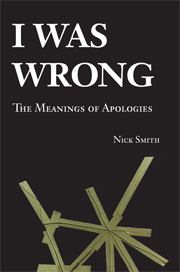Book contents
- Frontmatter
- Contents
- Acknowledgments
- Introduction: Apologies as a Source of Moral Meaning in Modernity
- Part One Apologies from Individuals
- 1 The Meanings of Apologies
- 2 Elements of the Categorical Apology
- 3 Apologies and Gender
- 4 Apologies in Diverse Religious and Cultural Traditions
- 5 Unusual Cases: Apologizing to Animals, Infants, Machines, the Deceased, and Yourself
- 6 The Relationship between Apologies and Forgiveness
- 7 Varieties of Apologies
- Part Two Collective Apologies
- Conclusion: Previewing the Meanings of Apologies in Law
- Notes
- Index
6 - The Relationship between Apologies and Forgiveness
Published online by Cambridge University Press: 07 December 2009
- Frontmatter
- Contents
- Acknowledgments
- Introduction: Apologies as a Source of Moral Meaning in Modernity
- Part One Apologies from Individuals
- 1 The Meanings of Apologies
- 2 Elements of the Categorical Apology
- 3 Apologies and Gender
- 4 Apologies in Diverse Religious and Cultural Traditions
- 5 Unusual Cases: Apologizing to Animals, Infants, Machines, the Deceased, and Yourself
- 6 The Relationship between Apologies and Forgiveness
- 7 Varieties of Apologies
- Part Two Collective Apologies
- Conclusion: Previewing the Meanings of Apologies in Law
- Notes
- Index
Summary
We often understand forgiveness as synonymous with “accepting an apology,” which naturally leads discussions of apologies to examinations of the nature and meanings of forgiveness. Forgiveness has thankfully received far more attention than apologies within various Western philosophical traditions, including discourses from Seneca, Bishop Butler, Hegel, Nietzsche, Arendt, Derrida, and others. Many accomplished contemporary philosophers from diverse perspectives continue to contribute to this already rich field, including work by J. M. Bernstein, Cheshire Calhoun, Trudy Govier, Charles Griswold, Jean Hampton, Julia Kristeva, Martha Minow, Jeffrie Murphy, Martha Nussbaum, Kelly Oliver, Robert Solomon, Margaret Urban Walker, and others. Rather than offering a comprehensive account of forgiveness here – which would easily double the length of this book because the meanings of forgiveness seem as complex as those of apologies – I will instead note how some features of my theory of apologies might relate to forgiveness scholarship.
Most generally, I expect that just as binary views of apologies prove too coarse to appreciate the intricacies of apologetic meanings, binary views of forgiveness also oversimplify the range of meanings and functions of the practice. I find it misleading to claim that one day I experience negative attitudes and opinions toward an offender but the next day I am able to entirely overcome these emotions and reverse judgments. Even if someone who harms me offers a categorical apology and comports herself to my highest expectations, I still wonder if it might be too simplistic to claim without qualification that I forgive her.
Information
- Type
- Chapter
- Information
- I Was WrongThe Meanings of Apologies, pp. 132 - 139Publisher: Cambridge University PressPrint publication year: 2008
